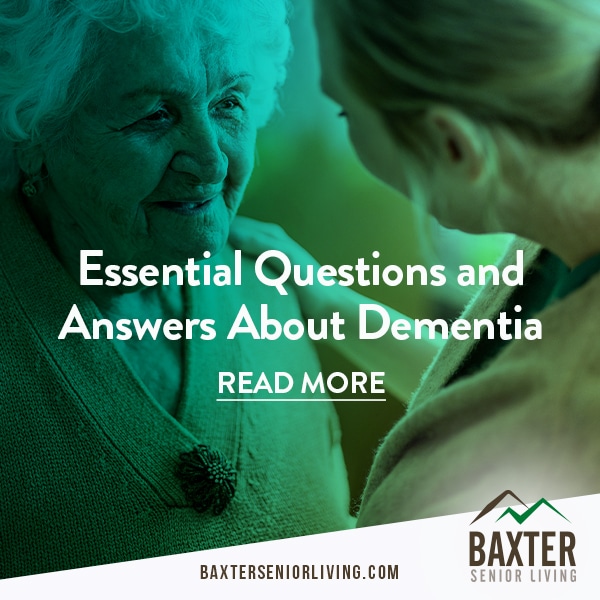For many people, having a parent or senior relative diagnosed with dementia or neurocognitive disorder will be their first encounter with the condition. It might be helpful to learn a few basic questions and answers as you begin your journey to learn more about the symptoms and progression of dementia.
What is Dementia?
Dementia is a word designated by medical professionals to refer to a group of symptoms caused by several diseases. It is an umbrella term that can cover the most frequent signs of mental confusion, intellectual impairment, and memory loss. It is often diagnosed when an otherwise alert adult shows impairment in two or more areas of intellectual ability, particularly if those areas impact their day-to-day functioning.
What Causes Dementia?
Dementia can have many different causes. It can be caused by diseases that, when treated, will alleviate the symptoms of dementia. For example, depression and thyroid diseases can lead to symptoms of dementia, but those symptoms can often be lessened if such underlying causes can be treated with medication or therapy. Other times dementia can be caused by Alzheimer’s disease, Parkinson’s disease, and Lewy body dementia. All of these different types of neurocognitive conditions display slightly different symptoms.
How Does Dementia Progress?
There is no set timeline for the progression of dementia symptoms. Most typically, families and loved ones will note small changes over many years; other times, symptoms may develop and worsen quite quickly or present suddenly after an acute or severe illness. The early stages of dementia can be tricky to notice. Often the person suffering the symptoms will notice themselves being more forgetful and confused and will compensate for their confusion in various ways. A person becoming more disoriented by unfamiliar environments, for example, may seem to be withdrawing or choosing to stay at home more frequently. The early stages of dementia can also be misdiagnosed as stress or depression (although both can also be factors in how dementia develops).
What are Some Common Dementia-Related Changes or Symptoms?
A person whose dementia is progressing may exhibit personality changes. Other changes may be a denial of their impaired functions, confusion surrounding scheduled tasks, disorientation of familiar surroundings, and they may begin walking slower. However, the progression of these changes seldom occurs along a straight line. For example, one morning, a person may seem “like their old self” and remember names and faces quickly; a mere hour later, they may not recognize their home surroundings and distrust family members trying to help them.
What is the First Step to Take When You Suspect a Loved One is Affected by Dementia?
One of the first things to do when helping to care for an aging loved one is to help them see a medical professional for a proper diagnosis, particularly the specific causes of their dementia symptoms. Understanding the type of dementia a person suffers can help your doctor and your loved one’s caregiving team devise the best possible medication, therapy, and care treatments. Once you have secured a diagnosis, you may want to contact specific organizations for help and further information. Beneficial organizations include the Alzheimer’s Association, AARP, Meals on Wheels programs, and eldercare associations or governmental aging resources in your local area.
What are Some Things to Remember When Accepting a Loved Ones Diagnosis?
One of the most important things to remember is that a person with dementia has a disease affecting their brain and behaviors. People with dementia may exhibit very challenging symptoms that seem unlike them. Please remember that the person you knew and loved previously is the same person you are caring for, even if they are acting differently. It is not personal. Providing care for a person with dementia can be highly challenging. Treat yourself compassionately, and it will be easier to direct that compassion toward your loved one.


